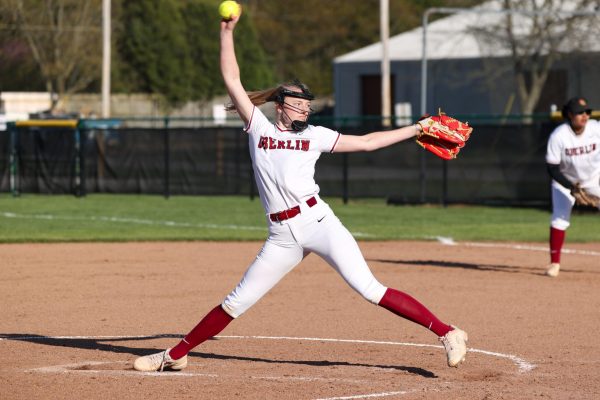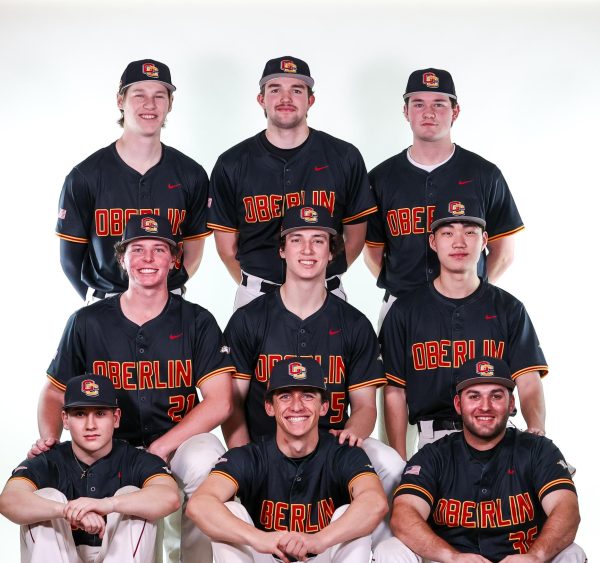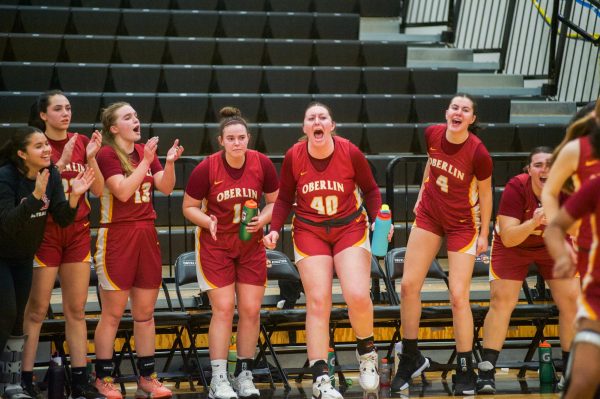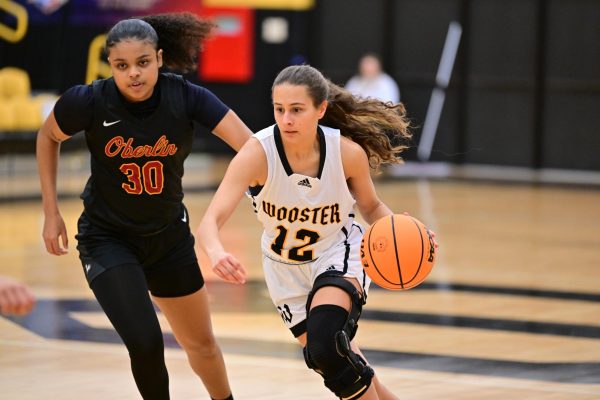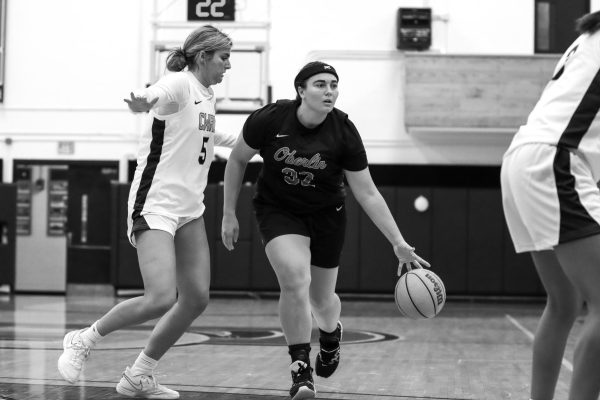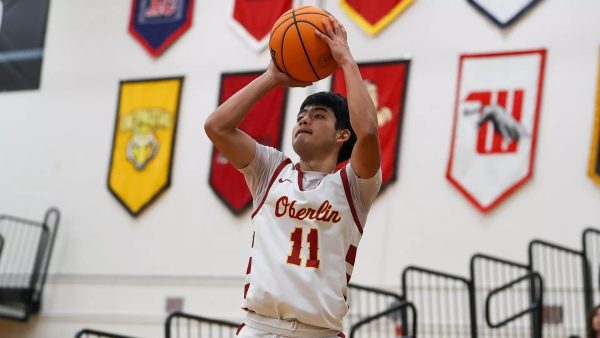Senior Student-Athletes Must Balance Athletics, Academics, Impending Graduation
At the conclusion of her junior year, College senior and softball player Emma Downing was unsure if she should apply to the Honors Program in History. She didn’t think she would get in — only seven students were accepted this year — and even if she did, she didn’t know if her schedule would allow for it. Nevertheless, she decided to take the plunge.
“There weren’t any other classes I wanted to take, and I wanted to push myself academically and see what I could accomplish,” Downing said. “I knew that coming up with a question and researching it all year to write a 60-page paper would be the hardest thing I’ve ever done academically.”
The History and Russian & East European Studies double-major maintains an impressive GPA considering how jam-packed her days are. Throughout her four years at Oberlin, Downing has juggled several different jobs to help her parents pay tuition. In addition to working for the College of Arts and Sciences Admissions Office and in Philips gym, Downing has been a captain on the softball team for three years.
She now spends a considerable amount of time researching the representation of prostitution in the Soviet Union media and what it reveals about gender roles, sexuality, and the social decline of the Soviet Union during Perestroika from 1985–91.
The idea came to Downing during one of Visiting Assistant Professor of History Christopher Stolarski’s Russian history courses. She did her final project on Russian prostitution during the 17th century after Stolarski mentioned it one day in class.
“I found it very interesting,” Downing said. “So when I began thinking about what I might want to look into for my honors project, I thought I would further explore that. There was already a lot of research done on this topic, however, so Professor Stolarski and I talked about researching the subject of prostitution while the Perestroika economic policy was in play.”
During Winter Term this January, Downing, who is conversationally fluent in Russian, plans to spend two weeks in Moscow, going through archived police records of interactions with prostitutes, as well as other Soviet publications that are only available in Russia. She will also explore the hotels that prostitutes worked in.
“Part of the project revolves around legal questions,” Downing said. “Was prostitution legal? What statutes were cited? When did the Soviet Union pass laws declaring it illegal? I’m currently in the process of applying for law school, so I’m just intellectually curious about the subject.”
Downing said she is trying to prove that the way prostitution was portrayed in the media says a lot about morale and the anxiety felt by Soviets at the time. According to her, Soviet men were concerned that women were exerting their sexuality in nontraditional ways, and the general public was concerned about foreigners influencing business in the Soviet Union by sleeping with prostitutes.
“Russians had xenophobic and racist opinions on this thing because they were afraid of Western ideas entering the Soviet Union,” Downing said. “Fear and decay of societal standards partially led to the collapse of the Soviet Union.”
Downing has been working alongside College senior and baseball player Dave Gaetano, who is working on his own project in the History Honors Program.
Gaetano, an Economics and History double major, plans to work as an Associate Consultant with Capco, a management consulting company, after graduation.
He is currently researching the impact of athletics at the Carlisle Indian Industrial School in Carlisle, PA, at the turn of the 20th century, specifically looking at how Native American students at this government-sponsored institution used athletics to create cultural continuity with their ancestral past. According to Gaetano, Native American students used sports to connect with their identity as Native people, despite the United States government’s desire to assimilate them into Western society.
“I chose this topic because it brings together a variety of topics I have a great interest in, from the period of discovery, Native American culture and society, American and Native American relations, and, of course, sports,” Gaetano said. “I am not certain as to what the thesis will be just yet, but I have a strong inclination that there was indeed a consciousness to this form of resistance, and it was achieved by using athletes as a conduit.”
The end result will be a 60- to 80-page paper discussing what the U.S. government wished to achieve by sponsoring Native American boarding schools, the consciousness of Native American resistance through the means of sports, and the impact of Indian athletics on native identity, culture, and past.
Meanwhile, in the Psychology department’s Honors Program, College senior and men’s basketball captain Eli Silverman-Lloyd is working to develop a new scale that measures college students’ attitudes toward sexual misconduct. He became invested in helping prevent sexual misconduct after getting involved in the Preventing and Responding to Sexual Misconduct program at the beginning of his junior year. His advisor, Assistant Professor of Psychology Meghan Morean, had the idea for a new scale, and she and Silverman-Lloyd decided to test it.
Silverman-Lloyd is using Qualtrics to publish online surveys for college students, which he hopes will help him develop his new scale by statistically determining the best items to use for the survey. Then he will see if the new scale can outperform the current gold-standard measure, the Illinois Rape Myth Acceptance Scale, by testing whether his scale is less prone to social desirability and more likely to predict perpetration of sexual assault.
“I’m hoping to gain insight into how students judge scenarios of sexual misconduct or assault when they are asked to assign punishment to them,” Silverman-Lloyd said. “I’m hoping it will better reveal their thoughts on certain issues to better guide intervention practices like PRSM and to see which populations are more likely to hold problematic beliefs surrounding sexual assault.”
Silverman-Lloyd said he has enjoyed conducting research and hopes to continue doing so post-graduation.
While Downing, Gaetano, and Silverman-Lloyd all prepare for the conclusion of their collegiate athletic careers, their senior honors projects mark the beginning of life after Oberlin. All three agree that their respective projects are a fulfilling yet bittersweet way to cap off their undergraduate career.


